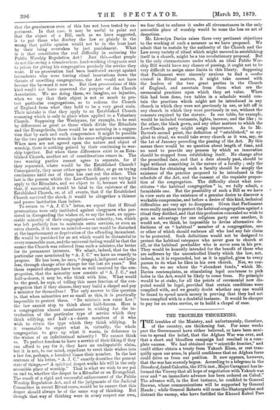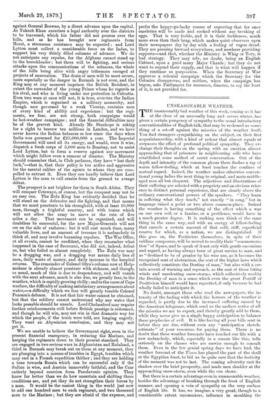THE TROUBLES THICKENING. T HE troubles of the Ministry, and unfortunately,
therefore, of the country, are thickening fast. For some weeks past the Government have either believed, or have been anxi- ous to spread the belief, that the Afghan War was over, and that a short and bloodless campaign had resulted in a com- plete success. We had obtained our "scientific frontier," and could either obtain a treaty from Yakoob Khan, or rest tran- quilly upon our arms, in placid confidence that no Afghan force could drive us from our position. It now appears, however, that the war has scarcely begun. According to a telegram in the Standard, dated Calcutta, the 27th inst., Major Cavagnari has in- formed the Viceroy that all hope of negotiation with Yakoob was over and "an immediate advance has been ordered on Cabal." The advance will, in the first instance, be confided to General Browne, whose communications will be supported by General Maude ; while General Roberts will cross the Shaturgardan and distract the enemy, who have fortified the Khoord Kabul Pass
against General Browne, by a direct advance upon the capital. As Yakoob Khan exercises a legal authority over the districts to be traversed, which his father did not possess over the hills, and as he has brought new regiments from Herat, a strenuous resistance may be expected ; and Lord Lytton must collect a considerable force on the Indus, to support his very thinly filled columns of advance. We do not anticipate any repulse, for the Afghans cannot stand up to the breechloader ; but there will be fighting, and serious attacks upon the communications of the columns, the whole of the hills being alive with angry tribesmen enraged at projects of annexation. The drain of men will be most severe, more especially as the danger in Burmah is not over, and the King may at any moment imprison the British Resident, to extort the surrender of the young Prince whom he regards as his rival, and who is living under our protection in Calcutta. Even two wars at once will not, it is true, over-tax the Indian Empire, which is organised as a military monarchy, and though now governed by a weak Viceroy, contains men of every kind of ability and experience ; but the regi- ments, we fear, are not strong, both campaigns would be hot-weather campaigns ; and the financial difficulties may be of the gravest kind. Already Mr. Stanhope is asking for a right to borrow ten millions in London, and we have never known the Indian balances so low since the days when India was governed for £25,000,000 a year. The Imperial Government will need all its energy, and would, were it wise, dispatch a fresh corps of 5,000 men to Bombay, not to assist Lord Lytton, but to form a reserve against any movement which might follow even a rumour of disaster. The Ministry should remember that, in Club parlance, they have "lost their luck,"—that is, that their policy is too active and aggressive for the mental calibre of the agents to whom they are com- pelled to entrust it. Even they can hardly believe that Lord Lytton is the man to call armies from the ground to avenge defeat.
The prospect is not brighter for them in South Africa. They will conquer Cetewayo, of course, but the conquest may not be an easy one. The Zulu King has evidently decided that he will stand on the defensive and die fighting, and that means that we must penetrate to his stronghold, with at least 10,000 men, through a frightful country, and with trains which will not allow the army to move at the rate of five miles a day. That movement can be organised, and will doubtless be successful, for the new Major-Generals will not err on the side of rashness ; but it will cost much time, many valuable lives, and an amount of treasure it is melancholy to think of, and may involve harassing repulses. The War Office, at all events, cannot be confident, when they remember what happened in the case of Secocoani, who did not, indeed, defeat us, but who foiled us almost completely. The Zulu war may be a dragging war, and a dragging war means daily loss of men, daily waste of money, and daily increase in the hospital returns. The remainder of Colonel Glyn's column now at Help- makaar is already almost prostrate with sickness, and though, as usual, much of this is due to despondency, and will vanish with the next advance, much is also due, we greatly fear, to the weather, which is rapidly growing chilly; and to the curse of Cape warfare, the difficulty of making satisfactory arrangements about water,—a difficulty which we fear will greatly trouble Colonel Pearson's defence. It is not that fair water cannot be obtained, but that the soldiery cannot understand why any water that looks passable should be unsafe. Lord Chelmsford may require further reinforcements still before British prestige is redeemed, and though he will win, may not win in that dramatic way for which the people, if the truth were told, are longing eagerly. They want an Abyssinian conclusion, and they may not get it.
We are unable to believe the Government right, even in the present financial emergency, in reducing the Marines, and keeping the regiments down to their present standard. They are engaged in two serious wars in Afghanistan and Zululand, a third in Burmah may break out on them at any moment, they are plunging into a morass of troubles in Egypt, txoubles which may end in a French expedition thither ; and they are holding a tone towards Russia which can be successful only if the Sultan is wise, and Austria immovably faithful, and the Czar entirely beyond coercion from Panslavonic opinion. They know far better than we do how uncertain and shifting those conditions are, and yet they do not strengthen their forces by a man. It would be the easiest thing in the world just now to add one hundred men to each regiment, and two thousand men to the Marines ; but they are afraid of the expense, and prefer the happy-go-lucky course of expecting that for once omelettes will be made and cooked without any breaking of eggs. That is very feeble, and it is their feebleness, much more even than their brag, which makes quiet observers open their newspapers day by day with a feeling of vague dread. They are pressing forward everywhere, and nowhere providing supports—and that, whether the Ministry is Whig or Tory, is bad strategy. They may rely, no doubt, being an English Cabinet, upon a good many Major Chards ; but they do not want to expend their supply, and that is what will happen if they continue so purposeless. When the Secretary at War approves a colonial campaign which the Secretary for the Colonies disapproves, and neither, when the campaign has begun, asks Parliament for resources, disaster, to say the least of it, is not provided for.



































 Previous page
Previous page